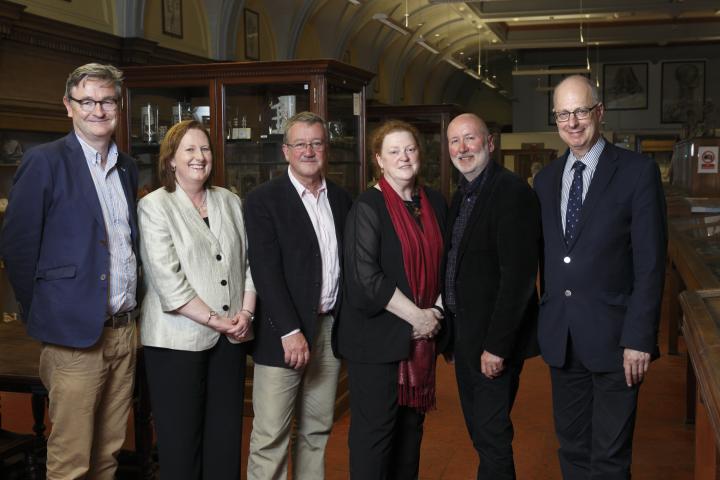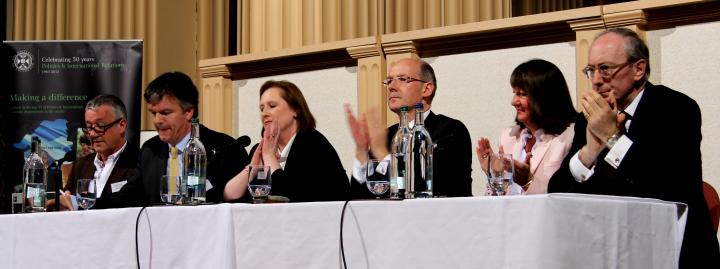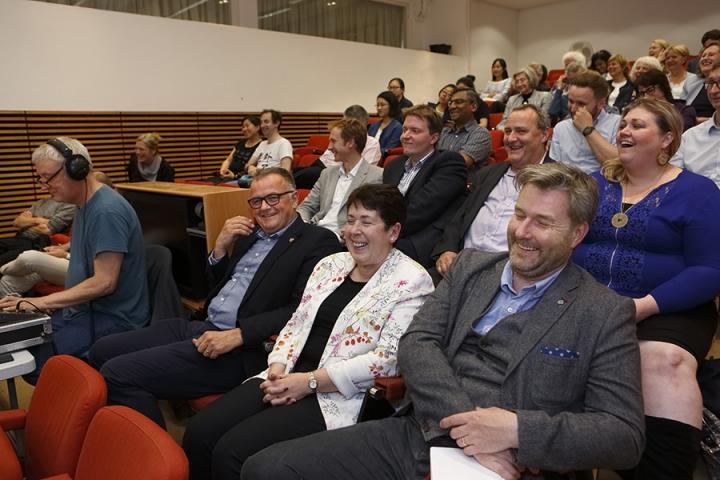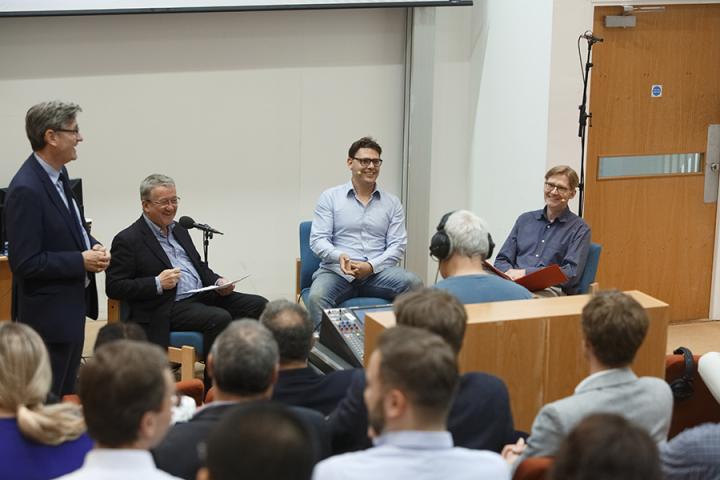Enlightened Connections
In the summer of 2017 an imaginative BBC Radio 4 series, 'Enlightenment After Dark', developed by the BBC in partnership with the University, saw two prominent Edinburgh alumni work together again, 35 years after their paths first converged as undergraduates.
The radio series they co-created offered something unique to listeners, covering subjects such as utopia; the body; and the digital world, through to ageing; and the Enlightenment beyond Europe, all brought together in the style of an Enlightenment salon debate.

Mutual interests
Susan Deacon and Allan Little first met during Susan’s Freshers’ Week in 1982 when Allan was an Edinburgh University Students' Association sabbatical officer. Susan had just begun a degree in social policy and politics while Allan had recently graduated with his MA History & Politics. As well as the crossover in their studies, the two shared friends and mutual interests, including visiting the Soviet Union with student companions in 1983.
“It was a fascinating time to be a student – especially if you were interested in politics.” says Susan. “Ronald Reagan was in the White House, Margaret Thatcher was Prime Minister and the Cold War was at its peak. Nuclear disarmament, anti-apartheid and liberation struggles in Africa and South America all featured as prominent issues in student debate and activity.”
Over the decades, both Susan and Allan went on to flourish in their chosen fields. Allan in his career in journalism with the BBC, becoming a highly acclaimed foreign correspondent. He reported from Baghdad during the 1991 Gulf War, and from Kuwait in the aftermath. He then covered the disintegration of Yugoslavia, co-writing a book and TV series on the subject and, in 1995, he moved to Johannesburg as the BBC’s Southern Africa correspondent working on, among other major stories, the Rwandan genocide. From 1997 to 1999 he was the BBC’s Moscow correspondent.
Meanwhile, Susan stayed closer to home. She forged a successful career in local government, returning to the University to complete an MBA in 1992. This was followed by a stint in management consultancy in the private sector before becoming MBA Director of Programmes at Heriot-Watt University. In tandem, she continued her involvement in politics holding senior positions in the Labour Party – both locally and nationally – and in 1999 was elected to the new Scottish Parliament as MSP for Edinburgh East and Musselburgh. Within weeks she was appointed as a member of the first Scottish Cabinet as Minister for Health and Community Care, a role that was to see her take centre stage in the devolution project.
At that point Susan and Allan’s paths crossed again. Allan, unable to avoid the lure of home, returned to Edinburgh to cover the beginning of Scotland’s first Parliament for 300 years. One of his early interviews was with Susan.
“I recall Allan coming to interview me in my office in St Andrews House,” says Susan. “His first question was – ‘When I last saw you, you were more likely to be protesting outside this building, now you’re sitting inside it. What happened?’ – I thought it was a good question!”
Accolades
The two have received their share of accolades over the years. Allan has won several, including a Gold Sony Radio Award for Reporter of the Year and an Amnesty International Reporter of the Year in 1992; Bayeux-Calvados Radio War Correspondent of the Year in 1994; the Grierson Premier TV Documentary Award in 2001; and a Sony Documentary Gold Award in 2002.
In her first year in Parliament, Susan was named Frontbencher of the Year and was shortlisted for Scottish Politician of the Year alongside Donald Dewar and Alex Salmond. Since standing down from Parliament in 2007 she has been appointed to leadership roles across enterprise, academia and charities. In 2015 she became Chair of the Institute of Directors in Scotland and she was awarded a CBE in the 2017 New Years’ Honours for services to business, education and public service.
Over the years, both Susan and Allan’s connection with the University has remained strong. In 1998 Allan was awarded the prestigious accolade ‘Alumnus of the Year’ and in 2012 he became a University Regent. In 2010 Susan was appointed an Honorary Professor with the School of Social & Political Science and, in 2012, she became the University’s Assistant Principal External Relations.
That same year, the politics and international relations department celebrated its 50th anniversary and during a variety of events, including whisky tasting and a ceilidh, Allan moderated a panel of prominent alumni, of which Susan was a part.
“One of the most satisfying things about that event was reconnecting with so many people from student days – both on the panel and in the audience.” says Allan.

Edinburgh connections
The future of the city of Edinburgh is something they both continue to care deeply about. In 2015 Allan became Chair of the Edinburgh International Book Festival and Susan became Chair of the Edinburgh Festivals Forum – each taking over their respective roles from Lady Susan Rice, herself a member of the University of Edinburgh Court.
This year they worked closely with a BBC production team to bring to fruition the Enlightenment After Dark series, and make the most of their Edinburgh connections.
“The need to bring people and ideas together across disciplines and boundaries is as great now as it was in the days of the Scottish Enlightenment,” says Susan. “This is a series of passionate intellectual encounters, recorded in a city that has long been a place of argument and ideas.”
In the city where Adam Smith and David Hume sat down to dine and debate, this timely series brings together leading thinkers to explore some of the big challenges of our time. The University is delighted to be working in association with the BBC on this important new venture.

Enlightenment salons
Enlightenment After Dark was hosted by Allan with Susan as the University lead. The series of five programmes was recorded during the Edinburgh Festival’s 70th anniversary year, in places within the city associated with the Scottish Enlightenment – including the University’s anatomy lecture theatre in the Old Medical School, and a former church that is now home to the University’s Data Lab. Off-campus venues included the Botanics Cottage at the Royal Botanic Gardens Edinburgh, the Library of Mistakes, and Newhailles House library.

Emulating the approach of the enlightenment salons, each programme brought together two leading thinkers in conversation with Allan, along with an invited audience who contributed to the discussion.
Staff and students from across a range of disciplines, as well as a number of alumni, took part. Historian debated with theologian; tech philosopher with epistemologist; artist with anatomist, and novelist with economist.
“It was a joy to host such an interesting and eclectic mix of discussions with so many thoughtful and accomplished people,” says Allan. “The BBC and the University each share a deep commitment to encourage thinking and ideas and I was delighted to see them work together in this way.”
Listen again
Sharing an unstinting level of energy, the two Edinburgh graduates already have their sights set on the next series and what it could bring to fruition. Until then, you can listen to the first series here:
Enlightenment After Dark on BBC iPlayer

